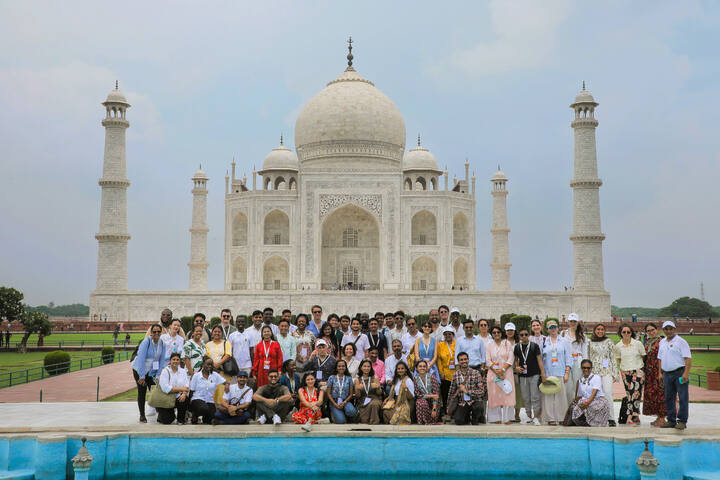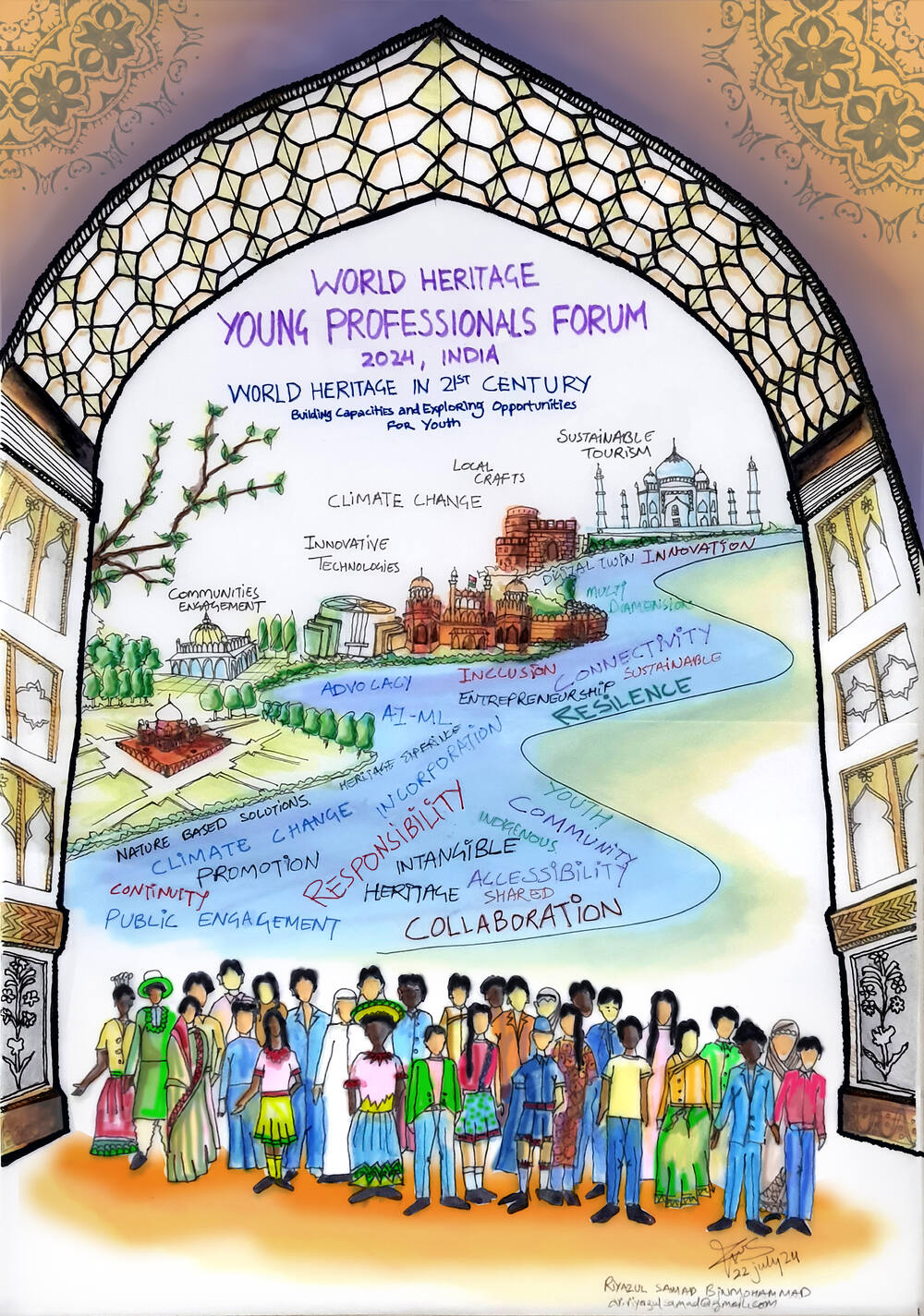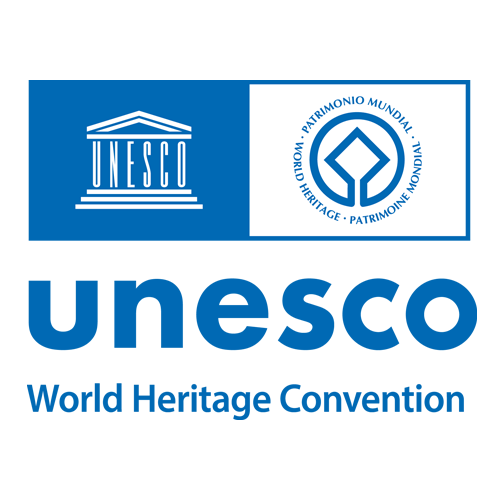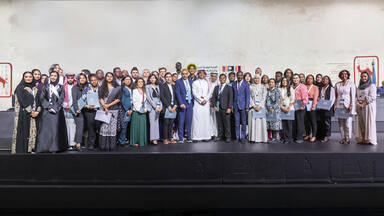“Our World Heritage is all of ours, and with that comes a shared responsibility. We have laid before you a blueprint of the future and will spend our lives working to make this vision a reality. This future, however, relies on all of us building a strong foundation.
We are the future, and now is our time to act.”
The Declaration
With a strong call for joint action concludes the Declaration of the 2024 World Heritage Young Professionals Forum, which was drafted by the 50 participating Young Professionals and presented during the opening of the 46th Session of the World Heritage Committee to over 1200 delegates at Bharat Mandapam in New Delhi, India.
The Declaration speaks as the voice of the youth and highlights their significant contribution to the protection and preservation of World Heritage. As representatives of the future leaders of World Heritage, the young professionals address the challenges of the 21st century impacting World Heritage sites and articulate ideas and principles for inclusive, community-based, and innovative approaches to safeguarding those irreplaceable places of Outstanding Universal Value (OUV) for future generations.
The Declaration serves as a powerful outcome and advocacy tool, demonstrating the expertise and learning of the participants, their engagement in the issues at hand, and their commitment to actively contribute to the future management and stewardship of World Heritage sites.
Young voices shape the future of World Heritage
© UNESCO
World Heritage in the 21st Century: Building Capacities and Exploring Opportunities for Youth

© Archaeological Survey of India / World Heritage site visit with Indian heritage expert KK Muhammed at Taj Mahal in Agra.
The 2024 edition of the World Heritage Young Professionals Forum took place from 14-23 July under the overarching theme “World Heritage in the 21st Century: Building Capacities and Exploring Opportunities for Youth” and was hosted by the Ministry of Culture of India through the Archaeological Survey of India at the Pt. Deendayal Upadhyaya Institute of Archaeology, Greater Noida, Uttar Pradesh, India.
From over 3500 applications, 50 Young Professionals from 31 countries were selected based on their diverse expertise and inspiring youth-led projects at World Heritage sites. They consisted of 20 Indians and 30 internationals, with equal geographical balance and gender representation, including many from Small Island Developing States (SIDS).
Accompanied by numerous local and international experts, notably experts from the World Heritage Centre (in person or remote), the young professionals have been engaged in various topics linked to World Heritage to gain enriching insights, build capacities, explore opportunities and reinforce their commitment in World Heritage conservation, preservation and promotion. Through a variety of presentations, roundtables, discussions and World Heritage site visits, as well as cultural events, the young professionals explored over the course of 10 days the subthemes of innovative technologies, climate change, sustainable tourism, and community-based approaches. They also discovered the rich heritage of India and discussed the opportunities in managing local and World Heritage with an approach rooted in community engagement and collective participation.
Each day was dedicated to one of the subthemes of the Forum and linked to a World Heritage site visit or special venue. Below is an overview of some of the Forum sessions:
The young professionals had the opportunity to explore the subtheme of new and innovative technologies at the Prime Ministers’ Museum to discuss the opportunities and challenges of technological advancement and their role in promoting World Heritage.
The participants visited the Red Fort Complex in New Delhi and learned more about the rejuvenation of the Ganga river, which led them to address the effects of climate change on cultural and natural heritage through a multidisciplinary approach.
They visited the emblematic Taj Mahal and Agra Fort, where they gained insights into the sites and discussed measures for sustainable tourism in the context of World Heritage.
At Humayun’s Tomb they also discussed the important role of communities and how we can leverage World Heritage conservation as a participative approach alongside communities.
Concluding the learning experience, a joint day with the participants of the World Heritage Site Managers’ Forum was organised to share inspiring practices on World Heritage education and youth engagement, to network and exchange about their local challenges at the sites, and jointly discuss and formulate recommendations for meaningful youth engagement in management processes.
Opportunity for Transformative Learning and Networking
This Forum served as an enriching and stimulating platform for international collaboration and exchanges and reiterated the role of youth and young professionals as the biggest opportunity and hope for securing a sustainable future for World Heritage.
In the sessions “Inspiring practices from around the world: Local Action for World Heritage”, the young professionals presented, every day during the forum, their own inspiring work, shared the challenges they are facing in a local context, discussed ideas to solve them and to find partners along the other young professionals for collaboration.
In the spirit of collaboration, friendship and “listening for understanding”, the participants gained valuable intercultural competencies and fostered strong networks for their projects and professional careers. The inspiring artwork by one of the participants visualises the joint journey and transformative learning experience, as well as symbolising the importance of cooperation in the protection of our rich shared humanity and diversity of heritage.

© Riyazul Samad Binmohammad
About the Forum
© Archaeological Survey of India / World Heritage in the 21st Century: Building Capacities and Exploring Opportunities for Youth
As an integral part of the 46th Session of the World Heritage Committee and in the framework of the UNESCO World Heritage Education Programme, the Ministry of Culture of India through the Archaeological Survey of India hosted the World Heritage Young Professionals Forum 2024 under the theme of “World Heritage in the 21st Century: Building Capacities and Exploring Opportunities for Youth” from 14 to 23 July 2024 at the Pt. Deendayal Upadhyaya Institute of Archaeology, Greater Noida, Uttar Pradesh in India.








